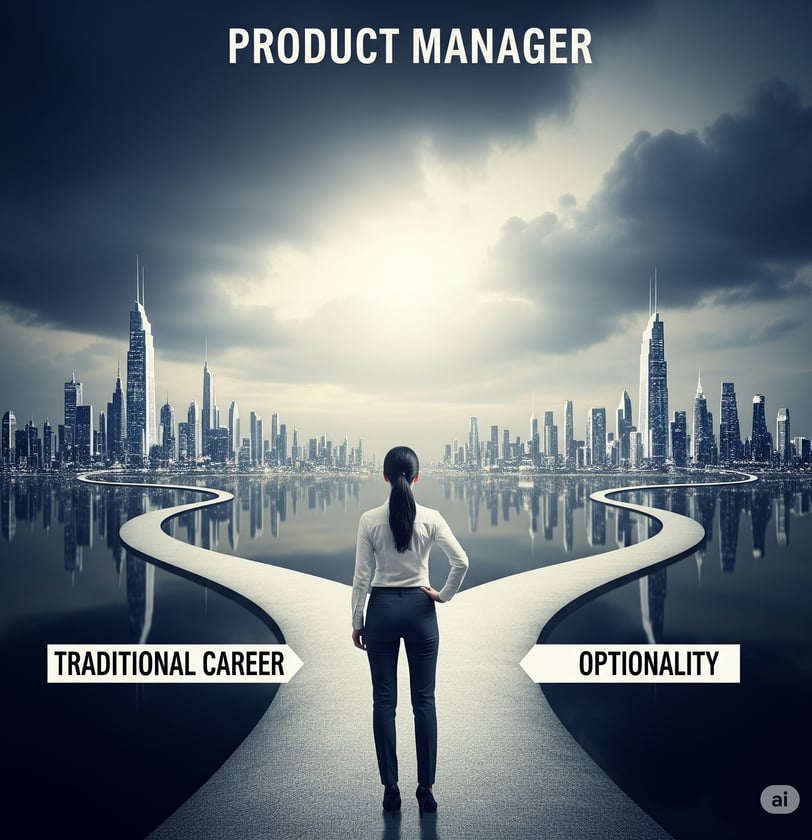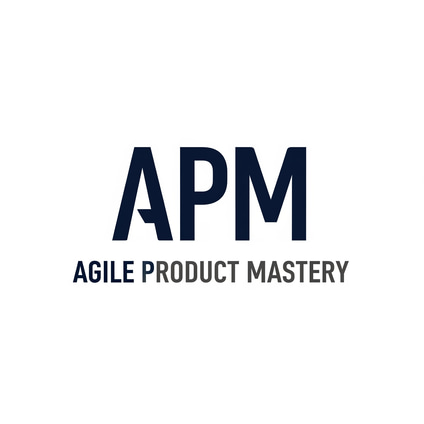The New Safety Net for Product Leaders Isn’t Job Security — It’s Career Optionality
Mid-career product leaders are rethinking job security. Learn how career optionality can help you stay relevant, resilient, and in control.
AGILE LEADERSHIPCAREER STRATEGYPRODUCT MANAGEMENTFUTURE OF WORKPROFESSIONAL DEVELOPMENT
Written by: Matt Gregory - Founder Agile Product Mastery
7/13/20254 min read


For decades, job security was the holy grail. You found a solid role in a respected company, climbed the ladder, collected bonuses and superannuation, and (hopefully) left on your own terms.
But in 2025, even high-performing product leaders are watching restructures happen around them — or to them. Promotions are paused. Roadmaps are shelved. And AI, outsourcing, and headcount pressure have turned once-stable roles into question marks.
If you’re a mid-career product leader, the writing is on the wall:
Job security is no longer your safety net. Career optionality is.
What is Career Optionality?
Career optionality is the ability to create and choose from multiple professional paths — even if you’re currently employed full-time.
It means you’re not tied to one role, one employer, or even one skill set. You’re actively investing in leverage — the kind that gives you freedom when conditions shift.
It’s not a new concept, but it’s becoming essential in an era of uncertainty and change.
Why This Matters for Product Leaders
Product people are built for ambiguity. We thrive on iteration, discovery, and delivering impact. But ironically, many of us still follow a rigid career model:
One employer at a time
One stream of income
One industry, often regulated
And all our influence tied to internal recognition
That model feels increasingly brittle.
And when you’re in your 40s or 50s, starting over becomes more complex — especially in markets that prize youth, tech fluency, or startup experience.
Optionality is how you build resilience into your career — not by abandoning your job, but by creating new doors before you need them.
Four Ways to Build Career Optionality (Starting Today)
Here’s how mid-career professionals — myself included — are actively building safety nets that scale:
1. Build a Public Personal Brand
“If you’re not visible, you’re vulnerable.”
You already have insight. Experience. Perspective. But if it only lives in email threads, internal decks, or closed Slack channels, it can’t help you.
Start showing up online:
Post weekly on LinkedIn
Share frameworks you’ve used
Comment insightfully on other leaders’ posts
Teach what you know, even if it feels “basic” to you
You’re not trying to be an influencer — you’re building visibility + credibility. When layoffs or pivots happen, that visibility creates inbound interest, not just sympathy.
2. Monetise What You Know
You don’t need to launch a full coaching business tomorrow. But consider this:
What do people already ask you about?
“How do you roadmap in regulated industries?”
“How do you handle stakeholder alignment?”
“How do I grow into product leadership?”
Each of those is a potential digital product:
A $9 Notion template
A $29 ebook
A $199 cohort-based workshop
You’ve spent years building IP in your head. You don’t have to wait for a client brief to use it.
3. Build a Network Beyond Your Org Chart
In most large companies, your influence rarely extends beyond your team or division. That’s fine — until it isn’t.
Start building a network that’s portable:
Join industry groups (online or local)
Engage with peers in other industries
Reach out to people doing what you want to be doing in 2–3 years
You don’t need thousands of followers. You need a signal network — people who will tag you in opportunities, remember your niche, or collaborate down the line.
4. Stack Skills That Future-Proof You
We’re in the middle of a multi-front transformation:
AI is re-shaping workflows
Agile is being re-interpreted across domains
Decision velocity matters more than ever
Optionality often comes down to option value: how many future scenarios are you ready for?
That’s why building skills like:
AI prompt fluency
Product ops
Agile governance
Fractional leadership
…can give you unfair advantages when conditions shift.
You’re no longer at the mercy of one company’s roadmap or budget cycle.
Optionality ≠ Abandoning Your Career
Let’s be clear: This isn’t about jumping ship. It’s about creating freedom while staying planted.
In fact, building optionality:
Makes you a more valuable employee
Helps you negotiate better
Gives you resilience during reorgs or market slowdowns
Opens doors if you ever do decide to go independent or fractional
It’s a career expansion, not an escape plan.
What This Looks Like in Practice
Let me share an example from my own world.
In the banking sector, I’ve seen entire transformation programs — worth $40M+ — unravel because they were over-reliant on one stream of leadership or delivery. No backups. No fallbacks. No optionality.
Sound familiar?
At a personal level, it’s the same risk. When your entire career relies on a single stream of validation, income, or access, you’re exposed.
That’s why I started building:
An audience on LinkedIn
A content library for product leaders
Passive income through digital resources
And thought leadership platforms like Agile Product Mastery and Baltimore Advisory
It didn’t happen overnight. But now, I don’t fear change — I can respond to it.
Your Turn: One Small Step Toward Optionality
Here’s a challenge for you:
Post one LinkedIn insight this week
Write down 3 things people ask your advice on
DM someone you admire outside your company
Sketch a rough outline for a tiny digital product
You don’t need to build a course, start a podcast, or write a book today. You just need one step that creates future options.
Final Thought: You Don’t Need Permission to Future-Proof
You’ve earned your place through experience. But staying relevant — and resilient — means evolving from “just” a role into a reputation, a platform, and an option engine.
Optionality is the new safety net.
And you don’t have to wait for someone else to build it for you.
Want help designing your own optionality roadmap?
Subscribe to the newsletter where I share weekly insights for product leaders navigating mid-career decisions, agility, and leadership growth.
© Agile Product Mastery — Build a career that scales. Not one that burns out.
Powered by Baltimore Advisory Pty Ltd — ABN 97 678 312 475 — All rights reserved
Follow us on LinkedIn
